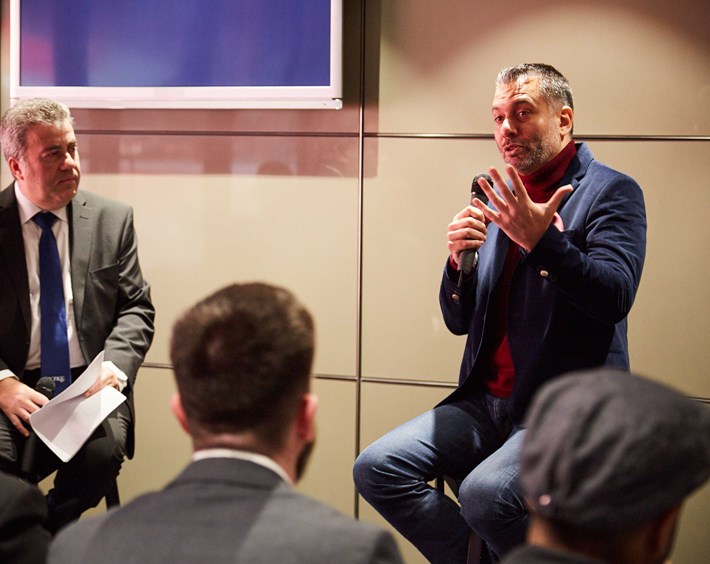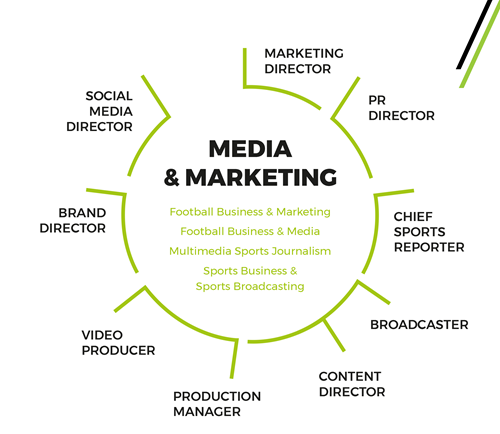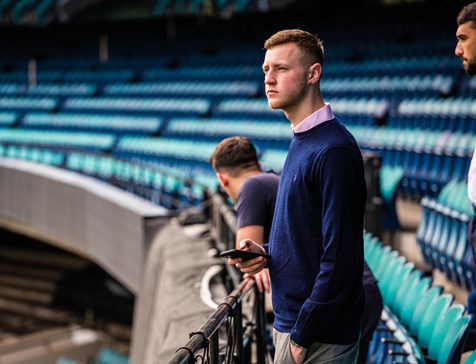Looking to start this September? It’s not too late to score your dream career – Apply through Clearing today and begin your studies at UCFB!
Degree overview
On this programme you will explore facets of media communications and develop understanding of the relationships between industry stakeholders. You will also gain contextual insight into how public relations and journalism relate to the business of sport.

Degree content
UCFB brings senior figures from organisations such as Sky, BBC, ITV, talkSPORT and governing bodies to work with our students and provide them with important insights in to how the media really works in order to supplement the teachings from UCFB’s own industry professionals and experienced media academics.
The media pathways explore the many facets of media communications and develop your understanding of the interconnected relationship between industry stakeholders. You will also gain an understanding of football business and media by introducing international football business models and management concepts, business planning, contemporary issues and public relations events strategy. There will be opportunities to develop your practical application of how football brands communicate to their audiences through PR related activity.
Teaching locations for this degree include:
In addition to our teaching locations, we also use specialist facilities throughout the academic year as well as additional facilities where required.

I’ve long believed that in order to maximise your potential and become the best in your chosen field, it is crucial that you surround yourselves with the industry’s best and UCFB offers precisely that.
Modules
- Skills for Learning
- Mental Wealth
- Research Project
- Contemporary Issues in Sport
- Foundation of Media Practice
- Media Law and Application
- Principles of Sports Media
- Understanding the Business of Football
- Industry Competencies (Mental Wealth)
- Sport, Media and Society
- Introduction to Broadcasting
- Business of Digital Media
- Applied Digital Journalism
- Media Law and Ethics
- Industry Readiness (Mental Wealth)
- Research Methods
- Public Relations Strategy
- TV Studio Production
- Football Brand Management
- PR Crisis Management in the Football Industry
- Digital Futures
- Professional Project
- Industry Engagement (Mental Wealth)

University Campus of Football Business is an embedded college of the University of East London. All graduates that begin their degrees with UCFB from September 2021 onwards will receive a degree from the University of East London.
Click here to download the course specification
- QAA Subject Benchmark Statement for Communication, Media, Film and Cultural Studies (2019)
- QAA Subject Benchmark Statement for Business and Management (2019)
Visit the QAA website to access each of these benchmark statements.
Entry requirements
- UCFB Wembley course code : FM1F
- Institution: U10
- Campus: W
- UCFB Manchester Campus course code: FM1F
- Institution: U10
- Campus: E
- 64 UCAS tariff points or equivalent non-tariff qualifications
- GCSE Maths and English Language (Grade C/4 or above) or equivalent e.g. Functional Skills Level 2
- International applicants will be asked to pass the Academic IELTS test with a minimum overall score of 6.0 and no less than 5.5 in each of the four elements
All applications are reviewed on a case by case basis. If your academic achievements do not meet the minimum level required but you have considerable professional experience, please contact admissions@ucfb.com.
Please be aware that all applicants who do not hold British or Irish nationality will require a visa to study in the UK
Our access to a UK Government Student Visa licence is currently being reviewed. This means we are unable to consider applications from any applicant who would require a student visa to study in the UK as we cannot issue a Confirmation of Acceptance for Studies (CAS).
If you are unsure whether you would need a visa to study in the UK, or for more information, please contact compliance@ucfb.com.
If you don’t hold a visa for the UK and would still like to study with UCFB, please consider Football Coaching (Distance with Attendance).
- UCFB Wembley course code: FM10
- Institution: U10
- Campus: W
- UCFB Manchester Campus course code: FM10
- Institution: U10
- Campus: E
- 96 UCAS tariff points or equivalent non-tariff qualifications
- GCSE Maths and English Language (Grade C/4 or above) or equivalent e.g. Functional Skills Level 2
- International applicants will be asked to pass the Academic IELTS test with a minimum overall score of 6.0 and no less than 5.5 in each of the four elements
All applications are reviewed on a case by case basis. If your academic achievements do not meet the minimum level required but you have considerable professional experience, please contact admissions@ucfb.com.
Please be aware that all applicants who do not hold British or Irish nationality will require a visa to study in the UK.
Our access to a UK Government Student Visa licence is currently being reviewed. This means we are unable to consider applications from any applicant who would require a student visa to study in the UK as we cannot issue a Confirmation of Acceptance for Studies (CAS).
If you are unsure whether you would need a visa to study in the UK, or for more information, please contact compliance@ucfb.com.
If you don’t hold a visa for the UK and would still like to study with UCFB, please consider Football Coaching (Distance with Attendance).
We accept applications with advanced standing via our Advanced Prior Learning (APL) application process. Should you wish to apply for direct entry into Year 2 or Year 3 of one of our undergraduate degree programmes, you will be required to complete an APL application form and provide us with evidence of your previous studies.
Please contact admissions@ucfb.com for further detailed guidance. Please note that should you wish to apply via this process, we strongly encourage you to begin the application process early in the cycle and you will still be required to complete a UCAS application.
All applications for an undergraduate degree programme are submitted via UCAS. To apply, please visit UCAS.com.
Career prospects
This degree provides UCFB students with an insight into how public relations and journalism relate to the business of football and the wider sports industry with career opportunities as wide and varied as media and marketing manager, digital media executive, social media strategist, video service manager, videographer, football data analyst and match day commentator. Graduates have the ability to rise to senior managerial roles due to the management aspect of the degree.

Over 90% of UCFB graduates are in employment within six months of graduating and almost two-thirds of them work within the global sports industry.
At UCFB we bridge the gap between education and business, allowing a unique approach to education. We provide two curricula; the academic curriculum which encompasses exams and coursework and the Employability & Career Planning programme – a three year journey of professional and personal development.
This provides access to best-in-class industry guest speakers, additional qualifications and exceptional opportunities to apply for work experience placements to ensure our students graduate as well-rounded, empowered professionals.
Find out more about your career journey at UCFB

Each of our UCFB undergraduate degrees is underpinned by an embedded strand of learning and skills development, including a formalised a short work-placement opportunity, to better equip students for the 21st century workplace and enhance employability opportunities.
This allows students to develop a set of key transferrable skills to ensure they are ready for the modern workplace when they graduate, including emotional, social, physical, cultural and cognitive intelligence, digital proficiency, industry and community connections, and giving back to the community through projects and volunteering.
Every UCFB degree has one Mental Wealth module in each academic year to cover these skills, and our learning outcomes for all modules are closely mapped to these same competencies in order to maximise graduate's industry readiness and career opportunities.

Luton Town’s rise over the last decade is well documented. After dropping into the National League in 2010 for the first time in their history, the club have since made their way back to the Championship and currently find themselves comfortably in mid-table. One person at the club who is now documenting their comeback is student Declan O’Reilly, who recently secured a work placement at the club as a videographer.
Read more
From hosting her own show on The Football Terrace YouTube channels to networking with the right people, Mya Graham used her three years at UCFB wisely to ensure she had the best possible chance of employment upon graduation.
Read more
Visit our dedicated page about fees and student finance.
Tuition fees for international students are £14,950 per year. To apply to UCFB directly, you will need to use our UCFB applicant portal.
The provision of a facility or service including accommodation may be subject to an additional charge (i.e. separate from tuition fees). Where this is the case, we will make this clear in advance and payment for such service shall be made in accordance with any additional contract made between you and the University.
In some instances, optional activities provided by UCFB may carry an additional cost for participants (e.g. qualifications with external certification such as FA Coaching Badges). Any additional costs will be provided to students in advance of any such sessions running.
Students may need to buy a storage device, such as an SD card, to host their material in the broadcast modules in year two of the course. Costs for a SD or similar depend on the memory size. A typical 32GB card will cost around £10.
UCFB has a range of scholarship and bursary options to help with the cost of studying and to encourage students to embrace their time at UCFB and graduate with more than just their university degree. Click here to learn more.


UCFB provides an exceptional environment to live and learn in, with state-of-the-art facilities in two inspirational campuses in London and Manchester.
Find out more
















